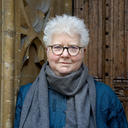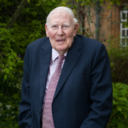ALUMNI STORIES: 'OXFORD EMPOWERED MY VOICE FOR CHANGE'

ALUMNI STORIES: 'OXFORD EMPOWERED MY VOICE FOR CHANGE'
Anastasiia Zagoruichyk (St Antony's, 2022) reflects on her Oxford journey, where her passion for sustainability was ignited. Now, she joins efforts with Ukrainian policymakers in crafting a sustainable future for the country
Published: 14 May 2024
Author: Tiya Muluzi
What drew you to study at Oxford?
My journey to Oxford was like navigating through a thorny path. Initially, I had never envisioned leaving my country, my city, where my family live, let alone pursuing studies abroad. I was deeply involved in my NGO in Kyiv, advocating for environmental reform alongside my colleagues. Everything seemed stable until Russia's intervention abruptly shattered our lives. I vividly remember the phone call that woke me with the chilling words: 'The war has begun.' Such moments change you and your life forever. Despite the decreasing coverage of Ukraine in the international media, the reality remains unchanged. The sound of rockets and sirens continue, taking lives daily. I refuse to let the world forget our reality.
How did you find the transition from Ukraine to the UK?
It was quite a challenging transition finding myself alone in a new country without my family by my side. But I knew I could be useful by being in the UK. During the first days, I met with the Member of the British Parliament to share my story and shed light on the situation unfolding in my country.
I went to the protests, advocated for vital military equipment for air defence systems. I spoke with the media and wrote articles, striving for maximum coverage. I understood the pivotal importance of international mobilisation from the outset, recognising the UK's leadership in supporting Ukraine.
The warmth and support of the British people made the transition smoother. Fortunately, I found my niche again, collaborating with Carbon Brief, a British climate and energy media outlet. It felt like I was returning to my sphere, enabling me to continue contributing meaningfully.
Through my articles, I highlighted critical issues such as the blockade Ukrainian seaports and Russia's attempts to manipulate global grain and gas supplies. I'm grateful for the platform and opportunity to make a difference during such tumultuous times.
You were part of the Oxford Graduate Scholarship scheme; how vital was your scholarship for attending Oxford?
Before coming across the Oxford Graduate Scholarship, I hadn't even checked the cost of studying here because I assumed it would be exorbitant. My parents aren't oligarchs, and I lacked the financial resources to cover tuition. Oxford only became a tangible possibility with this scholarship.
Its significance cannot be overstated; it was highly competitive, with only 26 recipients out of 800 applicants. We owe immense gratitude to the initiator of the scholarship, Professor Lionel Tarassenko, also the president of Reuben College. He accomplished the seemingly impossible by securing 26 fully funded places for us to receive the world's best education. This support was unprecedented, and he even extended it for the following years.
I must also acknowledge my college, St. Antony’s, for their support throughout my academic journey. Without the scholarship, I couldn't envision being here, which is why I am truly grateful.
Can you tell us about your journey since completing your MSc?
Since graduating and before embarking on the next chapter of my journey, I decided to spend some quality time with my family in Kyiv. Each day in Ukraine became incredibly precious, underscoring the weight of living under the constant threat of death.
However, I began a new job at the Pacific Northwest National Laboratory, an American lab under the US Department of Energy, as a Researcher and Analyst for several projects, one of which is the Net Zero World Initiative. My role involves bridging American expertise with Ukrainian policymakers and helping inform the development of strategic documents aimed at decarbonising energy systems and enhancing energy security. This is crucial for Ukraine amidst Russian strikes on the energy infrastructure.
When choosing a job after graduation, I was driven by a desire to contribute to Ukraine's recovery and development. I believe that every Ukrainian with access to modern education should leverage their skills to support the country through these tumultuous times, much like our brave fighters do every day on the front lines, defending our nation.
Have you faced any big challenges in your career so far, and how has your time at Oxford helped you in your journey?
Oxford played a pivotal role in helping me choose the right path. Sustainability is a vast and exhilarating field, yet it can also be overwhelming due to its breadth. I knew my master's programme at the Smith School of Enterprise and the Environment would guide me in finding my passion within this realm.
Through my studies, I discovered my enthusiasm lies in energy systems—a field equally expansive but deeply captivating. Energy systems offer diverse avenues for exploration, whether in transportation, buildings, industry, or beyond. This versatility is what draws me to it.
You've wanted to build a green economy for Ukraine. Can you share some ways you're working to make it greener and environmentally stronger?
I believe Ukraine holds immense potential in climate leadership. We possess vast land, critical materials, and a workforce of educated, hardworking individuals. Despite the ongoing war, we are actively working on new strategies and climate plans. For instance, recently, the Ministry of Economy published the National Climate and Energy Plan until 2030—a crucial step towards Ukraine's EU candidacy. Even amid conflict, efforts are underway to retrofit houses for energy efficiency and install solar panels.
However, the war has taken a toll on Ukraine's environment and biodiversity. Forest fires, deforestation, and explosions from mines have ravaged our landscapes. Prior to the conflict, Ukraine received up to 13% of its energy from renewables like solar and wind. Since the war's onset, we've lost around 30% of solar and over 80-90% of wind generation due to the Russian strikes.
Despite these challenges, I see a clear path forward for Ukraine's climate future. My role involves navigating these difficulties, but I remain optimistic about our potential and determined to contribute to our nation's resilience.
What is your vision for the future of sustainability efforts, particularly in Ukraine or globally?
I envision myself contributing to this transition. It's not about achieving everything in 10 or 20 years; it's an ongoing process of implementing the right policies and scaling up renewable deployment. We need policies that incentivise industries to embrace green technologies like decarbonised steel, a pursuit Europe is now prioritising. Ukraine holds significant potential in areas like hydrogen.
What advice would you offer to fellow alumni who are interested in making a meaningful impact in sustainability?
I believe it's important to take time to reflect on your accomplishments. When looking for a job, my advice is to apply immediately and then figure out your next steps. Keeping your knowledge fresh is crucial.
While it's beneficial to jump into the job market right after graduating, it's also essential not to put too much pressure on yourself. Personally, I was determined to secure a specific job and focused all my efforts on it. While my peers were starting their jobs, I was still in the application process, which was stressful.
In terms of sustainability, everyone can contribute at their own tempo. Simple actions like turning off lights when leaving a room or choosing a smaller car can make a significant difference.
What do you miss about Oxford?
Undoubtedly, it's the people that make the experience truly remarkable. It's hard to imagine any other place in the world where you can engage in a casual conversation with a Nobel Prize winner or the author of an IPCC report. I met a lot of good friends there, and we are still in touch. I didn’t want to leave!
How do you think Oxford changed you?
In terms of knowledge, absolutely. My journey at Oxford was transformative; it was like a leapfrog in my understanding, particularly in sustainability. It opened doors to new information and skills that profoundly changed me. Overall, the growth I experienced after Oxford has instilled more confidence in what I'm doing and in my knowledge.
Describe Oxford in one word
I think the word 'inspiring' describes Oxford perfectly. The city breathes inspiration, the fact that you’re walking with history in every rock under your feet. Its people and education alike are also sources of inspiration.
Find Anastasiia on social media.






































